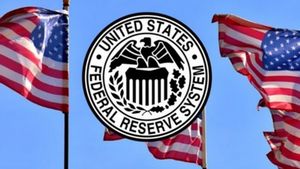JAKARTA The America First Policy Institute (AFPI) recently issued a serious warning regarding potential hazards related to the transition of fiat money to central bank digital currency (CBDC). In a report written by Michael Faulkender and David Vasquez, AFPI underscores the possibility of risks related to the Federal Reserve's direct issuance of digital dollars.
In the report, AFPI warned that introducing CBDCs could open government unmatched access to all individual financial transactions, which in turn could erode citizens' privacy. They attribute this to concerns over recent data exposure from the IRS (Internal Revenue Service), which suggests the potential for federal agency inability to manage American transaction data safely.
The report reveals that CBDC can open the door for authorities to isolate certain groups in the financial world. They set an example of Operation Choke Point in the Obama era as an illustration of this potential risk. The operation witnessed a secret push against banks to end ties with entities such as lenders and arms sellers.
The AFPI report noted, "The federal government's actions during Operation Choke Point underscore the essence of this issue, namely granting full authority to the federal government to step through the law in accessing and censoring the privacy and financial assets of American citizens."
SEE ALSO:
The authors of the report, Faulkender and Vasquez, highlight the dangers of giving the federal government unlimited power. They stressed that the granting of power like this could result in violations of the privacy and autonomy of American citizens as well as potential avoidance of existing legal processes.
The report also highlights doubts about the Federal Reserve's ability to launch a CBDC, referring to events such as high inflation and the fall of major banks in the first half of 2023. This directs writers to argue that a decision on the digital dollar should be the responsibility of Congress, not the Fed.
AFPI has firmly voiced the need for clarity in this regard and stressed that the Federal Reserve does not have the authority to issue CBDCs without the approval of Congress. Therefore, they urged Congress to pass laws governing and limiting the creation and use of CBDCs.
Overall, the AFPI report said that although innovation in payments may have its benefits, these benefits should not have sacrificed the consolidation of fiscal control provided by the Federal Reserve authorities. The two authors of the report called on Congress to set boundaries in the Federal Reserve's efforts to launch digital currencies, while underlining serious risks to individual privacy and autonomy.
Similar sentiment also emerged from several prominent figures, including US congressman Warren Davidson, 2024 presidential candidate Vivek Ramaswamy, as well as presidential candidates Robert F. Kennedy Jr. and Ron DeSantis. Criticism of CBDCs is getting louder amid the spotlight on major changes in financial and privacy systems.
The English, Chinese, Japanese, Arabic, and French versions are automatically generated by the AI. So there may still be inaccuracies in translating, please always see Indonesian as our main language. (system supported by DigitalSiber.id)
















